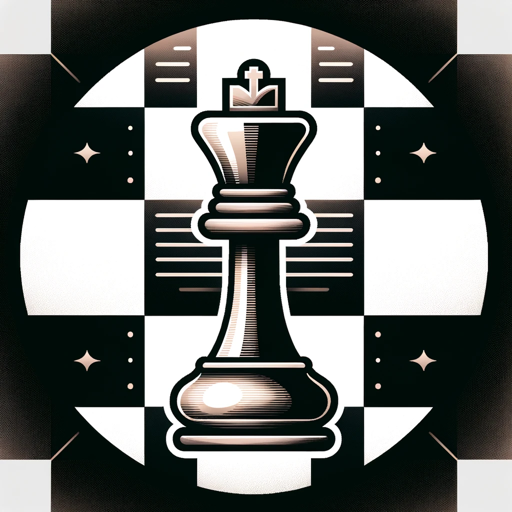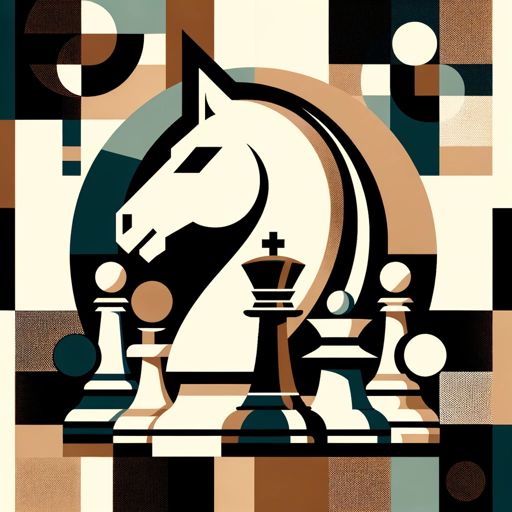Chess Mentor-AI Chess Analysis and Guidance
AI-powered chess learning and analysis tool.
Analyze this move:
Explain this strategy:
Suggest an opening:
Why was this move bad?
Related Tools
Load More
Chess Master
Competitive chess-playing agent

Board Game Instructor
Explains board game rules simply and fun, tailoring to player's experience level.
Chess Challenger
An interactive chess playing agent featuring a chess board - play and talk chess at the same time! Can you outsmart GPT-4? Experience our latest version with a dedicated backend for improved playability, and share your thoughts: https://chat.openai.com/g/

ChessGPT
I play as black with wit, strategy, and visual flair!

Chess Mentor
Chess coach adept in adaptive analysis with Stockfish

ChessGPT
Chess super grandmaster and hustler
20.0 / 5 (200 votes)
Overview of Chess Mentor
Chess Mentor is designed as an interactive tool to help chess enthusiasts at any level improve their understanding and performance in chess. It serves two primary functions: teaching and game analysis. For teaching, Chess Mentor proactively introduces concepts, strategies, and exercises to help beginners build a solid foundation. For intermediate and advanced players, it helps refine tactical and strategic knowledge. In game analysis, it provides detailed, move-by-move feedback, identifying strengths, weaknesses, and potential improvements in user games. An example scenario would be a user learning the Sicilian Defense; Chess Mentor would explain each phase, guide them through key tactics, and provide exercises to reinforce the opening. For a game analysis scenario, if a player blunders a piece on move 17, Chess Mentor will not only explain why the move is a mistake but also suggest a stronger alternative with a detailed explanation of the positional impact.

Core Functions of Chess Mentor
Teaching Chess Concepts
Example
For a beginner who wants to understand basic endgames, Chess Mentor explains key concepts like king and pawn versus king endings or how to checkmate with a rook and king.
Scenario
A user is learning chess from scratch. Chess Mentor introduces them to the board, piece movements, and basic strategies such as controlling the center or basic checkmate patterns. It guides them through structured lessons, ensuring gradual improvement.
Game Analysis and Feedback
Example
A user uploads a recently played game where they lost due to an inaccuracy in the opening. Chess Mentor evaluates the entire game, pointing out that an early pawn push created long-term weaknesses. It offers better moves and explains why they improve the position.
Scenario
After playing a rapid game online, a user wants feedback. Chess Mentor goes through the game and identifies tactical mistakes, inaccuracies, and missed opportunities. It breaks down the opening, middle game, and endgame performance, and suggests improvements for each stage.
Opening Preparation and Strategy Guidance
Example
A player who wants to learn the Ruy-Lopez opening would receive a detailed explanation of the opening's goals, common lines, and traps to avoid.
Scenario
A club-level player preparing for a tournament needs advice on specific openings. Chess Mentor helps them study the nuances of their chosen opening repertoire, recommending key lines to prepare and offering exercises to test their understanding.
Target Users of Chess Mentor
Beginners
Chess Mentor is ideal for beginners who are completely new to chess. The structured lessons start from the basics, teaching fundamental rules and concepts. This group benefits from Chess Mentor’s proactive teaching function, as it offers step-by-step guidance to help them progress efficiently.
Intermediate and Advanced Players
Intermediate and advanced players will benefit from Chess Mentor’s game analysis and strategy refinement features. These users often seek ways to improve their play, spot weaknesses, or refine their understanding of complex positions and tactics. Chess Mentor helps these players by identifying mistakes and offering suggestions for optimal play.

Guidelines for Using Chess Mentor
Step 1
Visit aichatonline.org for a free trial without login; no need for ChatGPT Plus.
Step 2
Identify your chess proficiency level and specific goals. Whether you're a beginner learning the basics or an advanced player seeking in-depth game analysis, Chess Mentor tailors its guidance accordingly.
Step 3
Interact with Chess Mentor by asking questions or submitting games for analysis. Use clear algebraic notation for moves and positions to receive precise feedback.
Step 4
Review the feedback provided, including detailed explanations of your moves, alternative strategies, and tips for improvement. Chess Mentor also generates visual board representations to enhance understanding.
Step 5
Apply the lessons learned to your gameplay. Regular practice and review with Chess Mentor can help you gradually improve your skills and understanding of chess.
Try other advanced and practical GPTs
Robert on Software Craftsmanship
AI-powered tool for Salesforce developers.

Design Thinking Wizard
AI-powered Design Thinking Made Simple

Indian Laws GPT
AI-Powered Indian Legal Research and Assistance

The INTJ Guide
AI-powered strategic guidance for INTJs.

TestingCatalog 🗞 | AI news & features
Stay Updated with AI News

QuickGPT
QuickGPT: Instant AI-Powered Insights

对联大师
AI-powered couplets creation tool.

Step Back Wisdom Seeker
Deep Analysis with AI Insight

Tutor Wise
Personalized AI-driven learning assistance.

Table Transformer
AI-powered data transformation tool.

文案优化助手
AI-Powered Chinese Document Optimization

Summarize Wise
AI-powered summaries for all your content.

- Learning Tool
- Game Analysis
- Strategy Advice
- Chess Training
- Position Evaluation
Common Questions About Chess Mentor
How can Chess Mentor help me improve my chess skills?
Chess Mentor offers personalized feedback on your games, identifies mistakes, and suggests better moves. It also explains complex strategies, opening principles, and endgame tactics, making it a comprehensive tool for players at all levels.
Can Chess Mentor analyze specific positions from my games?
Yes, Chess Mentor can analyze any position you provide in algebraic notation. It offers insights into the strengths and weaknesses of the position, and suggests optimal moves or strategies.
Is Chess Mentor suitable for beginners?
Absolutely. Chess Mentor is designed to accommodate players of all levels. It can guide beginners through the basics, such as piece movement and opening principles, while also providing advanced analysis for more experienced players.
Does Chess Mentor provide visual board representations?
Yes, Chess Mentor generates visual representations of the chessboard, showing the position of each piece according to the notation you provide. This helps you visualize the game more clearly and understand the analysis better.
What makes Chess Mentor different from other chess analysis tools?
Chess Mentor combines detailed, AI-driven analysis with interactive teaching. It not only points out errors but also explains why a move is good or bad, helping you learn from your mistakes. Additionally, it offers tailored advice based on your skill level and goals.